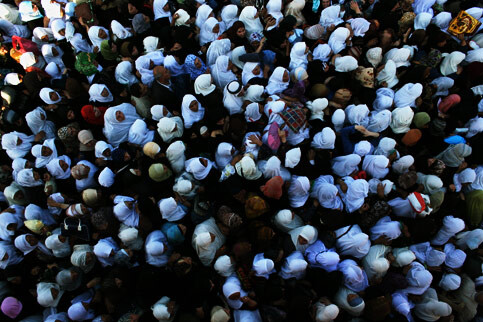The Electronic Intifada 21 November 2007

Palestinians from Bethlehem wait at a checkpoint while traveling to pray at the al-Aqsa mosque in Jerusalem, October 2007. (Luay Sababa/MaanImages)
JERUSALEM, 21 November (IRIN) - Traffic news on the radio in the West Bank is more likely to be about checkpoints and barriers than jams and accidents, as a complex system of controls and permits can make a short journey for work, family or medical reasons into a time-consuming marathon, according to a new UN report.
A joint Special Focus by the UN Office for the Coordination of Humanitarian Affairs (OCHA) and UNRWA, the UN agency for Palestinian refugees, released in November, said that only about 18 percent of the people who worked the land are now able to obtain Israeli-issued permits, required to access the zone between the Barrier and the Green Line, Israel’s pre-1967 border.
Israel began building the barrier in 2002 to prevent armed attacks, although much of it extends into the West Bank.
Israel has a permit system, which allows certain Palestinians access to areas otherwise forbidden, in an attempt to lessen the negative impact. The sometimes difficult to obtain permits can be issued for several reasons: access to agricultural land; studies; medical purposes; and other reasons.
Observers note the restrictions on movement cause economic harm and negatively impact on the daily life of the civilian population.
For example, a Palestinian needing to travel from Beit Furiq village, outside the northern West Bank city of Nablus, to East Jerusalem would need to cross at least four permanent checkpoints and any number of temporary ones during the 50 kilometer journey.
At Huwwara checkpoint outside Nablus — the second permanent one on his trip — a Palestinian would have to walk through, as few are permitted to drive. The wait can be half an hour or up to two hours, depending on the day. Each person, their ID and belongings are likely to be checked.
Some will be turned back, such as when restrictions are placed on men aged 16-35, an occurrence not uncommon in the Nablus region. Some Palestinians can be held up or detained for minutes or hours before they are allowed to continue.
Israel has said the area is a “hotbed” of militant activity and the restrictions are for security reasons.
Travel unpredictable
“It took me over five hours to get to Ramallah,” in the centre region, a Palestinian from Nablus recently told IRIN.
“On any given day, a Palestinian is never sure he can pass or how long it will take. Uncertainty is a major problem,” said Anat Barsella from the Israeli human rights group B’tselem. UN OCHA said unmanned roadblocks, such as gates, earth mounds and trenches also affect movement.
Palestinians tend to listen to the radio to get “traffic reports” on the checkpoints, to determine whether or not it will be realistic to attempt travel.
Economic impact
The restrictions also have an impact on the economy. In the past, observers said, a Palestinian farmer in the southern West Bank who sent produce to the north was able to do so about twice a day at a cost of US$75 per shipment. Now, he can make one shipment a day for about $300 dollars.
Certain roads are, for the most part, off limits to Palestinians, requiring them to take longer routes to reach their destinations.
The end result is a shrinking economy that has become more localized, as sections of the West Bank get cut off from each other. An aid worker told IRIN the restrictions make people more dependent on assistance.
“The internal closures within the West Bank delay aid deliveries and increase transportation costs, making the arrival of goods less predictable,” said Gwyn Lewis, head of UN OCHA in the occupied Palestinian territory.
Health
The limitations, rights groups say, also impact health. B’tslem reported recent incident of patients held up at checkpoints and even a birth at a roadblock, events which seem to be recurring more frequently of late, after several years of improvement.
Doctors also have a harder time reaching patients in remote areas. In the areas enclosed by the barrier, seven communities have no access to local primary health care, and nine said expectant mothers leave the area weeks before their due date to ensure access to medical attention, the Special Focus reported.
Israeli security concerns
Blaming Palestinian militants for operating within civilian areas, Israeli officials said the restrictions were for security reasons as they helped limit the movement of militants and weapons and in some cases led to the capture of men wanted on terrorism charges.
B’tselem told IRIN the problem with the restrictions is that they are “disproportional.”
“If the purpose is to protect Israelis inside Israel, then there are far too many restrictions inside the West Bank,” said Barsella, who wrote the organization’s recently issued report entitled “Ground to a Halt.”
However, Israel also restricts movement to protect its West Bank settlers whose presence is generally considered illegal under international law. Barsella said it was not legitimate to limit Palestinian movement while allowing nearly unhampered travel for the settlers.
Furthermore, East Jerusalem — a centre of Palestinian life with its hospitals and educational, cultural and religious institutes and sites — is treated by the Israeli government as part of Israel, although it is deeply connected to the West Bank.
Permits to enter Israel, mostly for work or medical reasons, are the hardest to obtain. A UN official said the number of workers with permits to enter Israel had dropped by about 80 percent in the last seven years.
This item comes to you via IRIN, a UN humanitarian news and information service, but may not necessarily reflect the views of the United Nations or its agencies. All IRIN material may be reposted or reprinted free-of-charge; refer to the copyright page for conditions of use. IRIN is a project of the UN Office for the Coordination of Humanitarian Affairs.